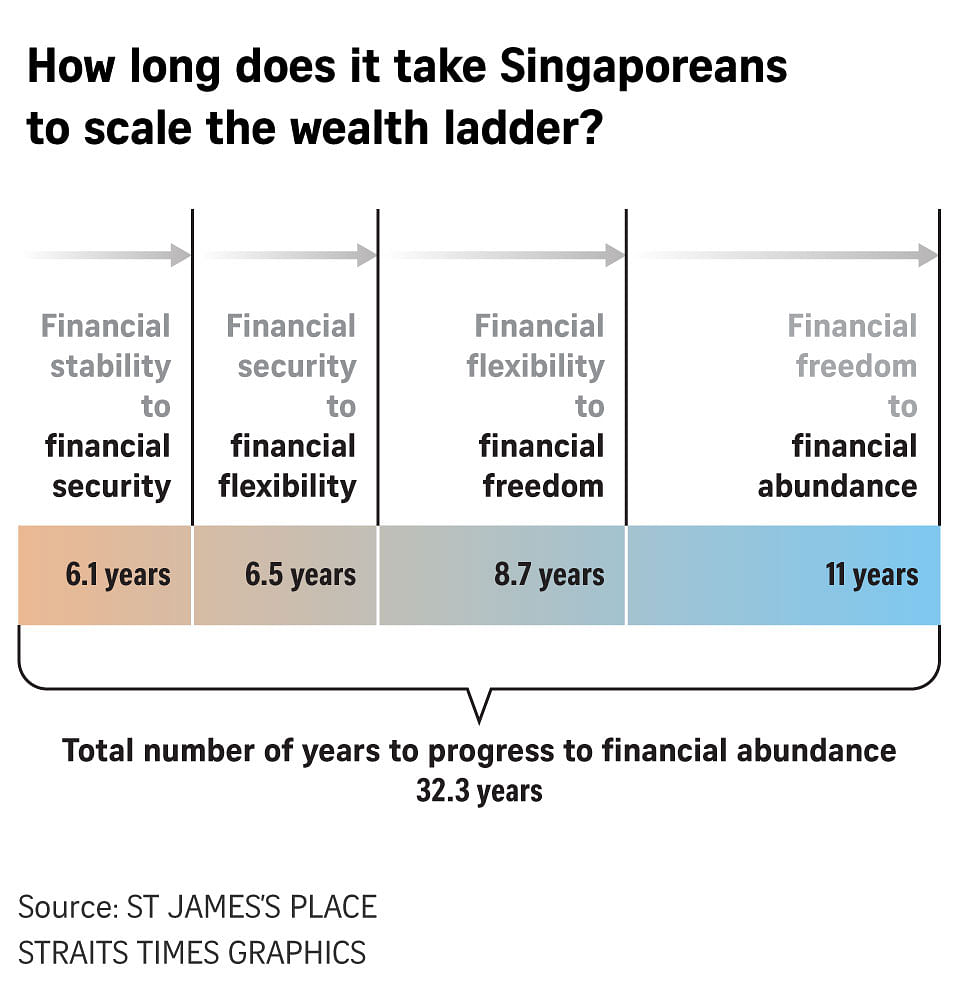SINGAPORE – It takes an average of 32.3 years to climb the wealth ladder from the first level of financial stability to the highest level of financial abundance.
This is what wealth manager St James’s Place posits in its report Accelerating The Wealth Journey – From Stability to Abundance, after interviewing 1,000 affluent Singaporeans between the ages of 25 and 64 between February and March 2023.
The respondents had a minimum annual household income of $70,000 to over $250,000, and held investments in stocks, property, shares and funds.
They were categorised into five different levels of wealth: financial stability, financial security, financial flexibility, financial freedom and financial abundance.
Mr Oliver Wickham, Asia partnership director at St James’s Place, said financial priorities can vary at the different levels of wealth. While individual circumstances and personal preferences do shape financial priorities, there are some general characteristics that correspond to each level of wealth.
The wealth management firm defined financial stability as the first stage where an individual has sufficient money after monthly expenses are paid to save a portion of his income.
For example, a fresh graduate out of university who is entering the workforce will be aiming for the first stage of financial stability. To achieve this, he should prioritise budgeting and set savings goals as well as work towards establishing an emergency fund, Mr Wickham said.
Mr Wickham also suggested that individuals at the financially stable stage should equip themselves with basic financial education and understand the benefits of long-term investing.
This would ready him for the next stage, financial security, which the study found would take an average of 6.1 years to attain. Someone in a financially secure position can, on top of being able to save a portion of his income, choose to invest his money.
An individual then needs another 6.5 years to get to a stage of financial flexibility, where he has sufficient financial investments and assets to cover his living expenses for up to a year.
Getting to financial freedom will take another 8.7 years on average, while 11 more years are needed to reach financial abundance.
Financial freedom means having sufficient financial investments and assets to generate enough passive income for life, while financial abundance is defined as having more than enough income for one’s lifetime.
The financial priorities at these two highest levels of wealth will shift from wealth accumulation to wealth preservation and generating a passive income for retirement.
Someone who has reached financial abundance will need to consider how to transfer his wealth to his future generations, St James’s Place said.
“He should prioritise retirement savings vehicles… and look at developing a comprehensive wealth-preservation strategy that includes estate planning and legacy planning,” Mr Wickham said.
Amid ongoing concerns of inflation eroding the value of one’s hard-earned savings, investors can still “protect and grow their wealth”, he noted.
“Scaling the wealth ladder and progressing to the next level of wealth is not impossible.”
Affluent Singaporeans interviewed identified three important aspects for growing and maintaining their wealth over time in the St James’s Place study: patience in investments (26 per cent), a disciplined investment approach (24 per cent), and financial literacy (22 per cent).
Financial literacy is the ability to make smart financial decisions about money, budgeting, finances and investments.
What stood out in the study was that the majority of the respondents believe that intergenerational wealth transfer should begin only when a family member has retired (39 per cent) or when a family member is deceased (30 per cent).

Only 22 per cent of respondents believe intergenerational wealth transfer and succession planning should begin while they are still living and working. Nine per cent do not believe in doing so at all.
“Initiating such conversations while the family member is active and healthy provides ample time to explore various options, establish a comprehensive plan and address any complexities or potential conflicts,” Mr Wickham said.
This allows for a smoother transition and can help to preserve family harmony and minimise potential disputes, he added.
Noting that intergenerational wealth transfer can impact the long-term financial well-being of families, he said: “Maintaining and transferring wealth across generations is beyond the finances, but more about preserving legacies and the dreams of future generations.”


